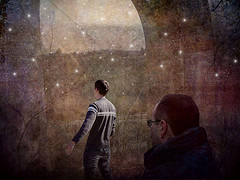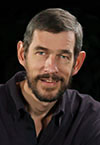 When I was in college, I wanted to find ultimate truth, if there was such a thing. I suspected it was not in a modernist’s neat and tidy formula. And I suspected it was not in a postmodernist’s notion that everything we know and believe results from our culture and environment.
When I was in college, I wanted to find ultimate truth, if there was such a thing. I suspected it was not in a modernist’s neat and tidy formula. And I suspected it was not in a postmodernist’s notion that everything we know and believe results from our culture and environment.
I compared every major religion and its take on ultimate truth. They all disagree. Thus to think that one, universal being or principle embraces all religions is blindly naïve. People believe that because they want to. It feels good. But the differences between these religions are fundamentally irreconcilable, which means such happy thoughts are nonsense.
Ultimate Truth is by necessity grounded in ultimate, eternal reality. So a good start would be to ask how major world religions view ultimate reality.
Hinduism conceives of ultimate reality in terms of “Brahman,” which is the origin of all things physical or non-physical and is ultimate truth. Brahman is both immanent (manifested here and now) and transcendent (beyond our vision or reach). Ultimately nothing is real; we are part of a dream in the mind of Brahman. Earthly existence is thus only a dream state, and through many reincarnations we may achieve nirvana, liberation from the affects of karma on cycles of rebirth, where there is no longer a sense of self, and where there is neither suffering nor desire but only bliss.
Taoism theorizes an impersonal ultimate reality, a principle, an eternal truth, called the Tao. This Tao, literally “(right) way,” is the absolute principle that is behind the universe, combined with the principles of yin (passive, female, earth, dark, and sustaining forces) in balance with yang (active, male, heaven, light, and creative forces). Together it all shows us a way of life that harmonizes with the natural order. It offers no answer as to how we got here or why. It simply points us to a wise way of living.
Buddhism has varying teachings, especially between the Theravada, Mahayana, and Hinayana schools. Yet they essentially all teach that there is no personal God or any kind of spiritual, material reality that exists itself as an ultimate reality or creator, nor is there any particular principle. “Gods” are temporal beings and attain transcendent status the way any human may likewise do through following the Four Noble Truths and Eightfold Path and achieving Nirvana. Ultimate truth would be transcendent truth that governs the universe and guides human beings. Like Taoism, it offers no answer as to how we got here or why, it just points us to a wise way of living.
Islam historically draws much of its idea of ultimate reality from Judeo-Christian thought, and the Quran posits Allah (Arabic for God) as ultimate reality in much the same way as the Bible does. Though it does not describe how we got here, only that Allah created the earth, it teaches that our purpose in life is to believe in and submit to Allah, who is similar to, but not identical with, the God described in the Bible.
Judeo-Christian teaching on ultimate reality is from the Bible, which depicts a supreme and personal God as Creator, with descriptions of creation in harmony with scientific discovery and theory (for example, the depiction of the six days of creation are exactly parallel to how things would have appeared from the surface of the earth through the geological time periods). Descriptions of this God go beyond normal human concepts of supernatural beings, for example, the Trinity and the unusual ways God interacts with humans. God expresses purpose for human existence, which lies primarily in relationship with him, the Creator.
The brain plays a role in all of this. Some make much of neurological processes and their relation to identifying physical reality versus spiritual experiences, for example, of God. After observing measurements of neural impulses, one might ask: Are what we thought were spiritual experiences of God really just the effects of brainwaves? Some might conclude that our wacky heads are making all this stuff up. But wait, the brain processes physical reality in essentially the same way that it does non-physical reality. That means whether something is physical or spiritual, the brain still has to process it’s perception of that thing. How else would we be aware of anything? This would mean that neural impulses are signs of the brain’s processing what the senses perceive, whether physical or spiritual. Scientific analysis addresses the brain’s processing, not fabrication of reality. To the brain, physical reality and spiritual reality seem to be complimentary.
The question remains, which of these spiritual experiences is the most valid?
Which has compelling evidence of truth?
The following articles explore that.
—-
Photo credit: Eddi van W. www.flickr.com/photos/spiritual_marketplace/3371511264/














spiritual journey is the journey of man in pursuit of the Truth.
man and only man can aspire towards self realization and thus in the process attain the second and most important objective of realization of GOD (TRUTH)
this is the very purpose for which man was sent on this earth with a human frame which is at the zenith of the creation of GOD.
he can thus become a Superman when three faculties of body, mind and soul are fully awakened by the practice of Meditations and inwards practice with the aid of a Living Preceptor
remember the Lord.
Love all and serve all